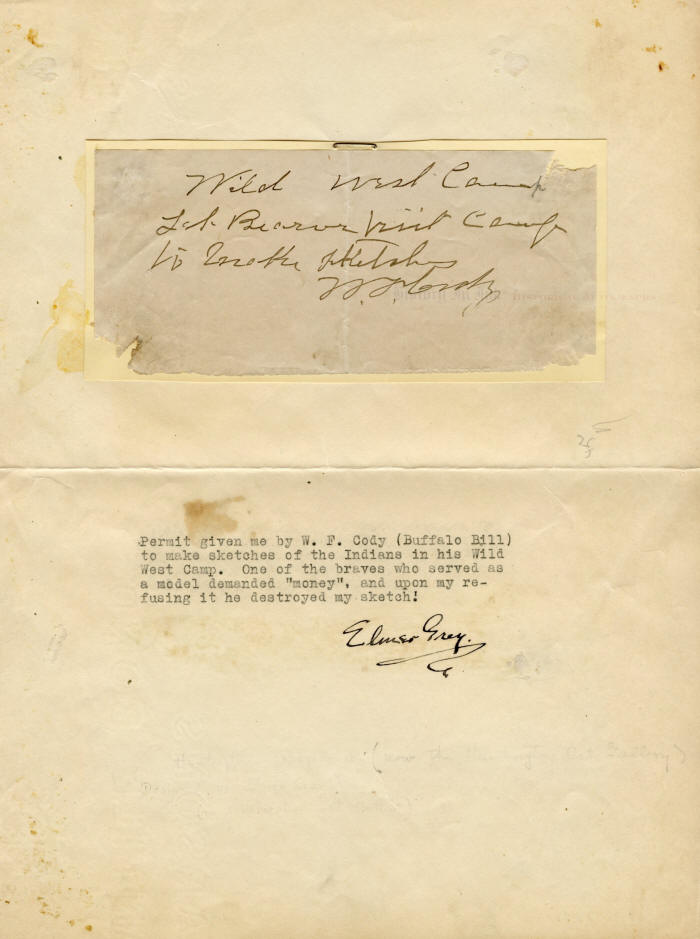
1431447
William F. Cody
“Buffalo Bill"
Scroll down to see images of the item below the description
Cody grants artist Elmer Grey permission to sketch Native Americans at his Wild West camp
William Frederick “Buffalo Bill" Cody, 1846–1917. American scout, buffalo hunter, and Wild West showman. Autograph Note Signed, W. F. Cody, on a 2¾" x 6" slip of paper. With accompanying note of provenance.
Cody grants permission to artist Elmer Grey to enter his Wild West camp in order to sketch Native Americans who were in the cast of his show. He writes: “Wild West Camp / Let Bearer visit camp to make sketches / W. F. Cody."
Cody gained his reputation and his nickname, "Buffalo Bill,” because of his skill in hunting buffalo when he worked as a scout for the United States Army from 1868 to 1872. Cody received the Medal of Honor as an Indian scout for the 3rd U.S. Cavalry during the Indian Wars. Apart from his scout duties, Cody hunted and killed buffalo to supply both the Army and employees of the Kansas Pacific Railroad. He reportedly killed 4,282 American bison over an 18-month period during 1867–1868.
His show career began in December 1872, when he teamed up with Texas Jack Omohundro in The Scouts of the Prairie, a Wild West show based in Chicago. The next year, “Wild Bill" Hickok joined them in a new production, called Scouts of the Plains, which toured for 10 years.
Cody founded “Buffalo Billʼs Wild West" in 1883. The show was a circus-like attraction that toured throughout the United States annually and toured Europe eight times. The cast included headline performers such as sharpshooters Annie Oakley and her husband Frank Butler, Gabriel Dumont, and Lillian Smith. From 1886 to 1888, the show played on Staten Island and at Madison Square Garden, drawing millions. In Europe, Cody gave command performances for both the Prince of Wales, later King Edward VII, and his mother, Queen Victoria, and in 1887 closed a highly successful London run after 300 performances with more than 2.5 million tickets sold. Cody, an American icon, became an international celebrity with his European success. In 1893, he changed the name of the show to “Buffalo Billʼs Wild West and Congress of Rough Riders of the World" and included not only Native Americans but performers from other cultures worldwide.
This note is tipped to a backing sheet, which itself is stapled to an 8½" x 11" sheet with a typed note of provenance signed by Grey. Greyʼs note identifies Codyʼs as the “Permit given me by W. F. Cody (Buffalo Bill) to make sketches of the Indians in his Wild West Camp. One of the braves who served as a model demanded ʻmoneyʼ, and upon my refusing it he destroyed my sketch!"
Grey is likely California architect and artist Elmer Grey (1872–1963), who designed many Southern California landmarks, including the Beverly Hills Hotel, the Huntington Art Gallery, and the Pasadena Playhouse. Grey was also an artist who painted in both oils and watercolors.
Cody has penned this note in brown fountain pen. The piece is tipped to a slightly larger piece of paper. One horizontal fold affects the signature and three words of the text. Codyʼs note shows a bit of soiling and has paper loss at three corners, affecting nothing, although the loss at the upper right is close to one letter of the text. The backing paper, but not Codyʼs note itself, is stapled to Greyʼs larger note, on which shows glue stains from prior mounting show through. Overall Codyʼs note is in fine condition, and Greyʼs is good.
Unframed.
_____________
This item has been sold, but
click here to see other
American History items
that we are offering.



